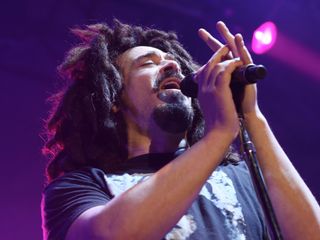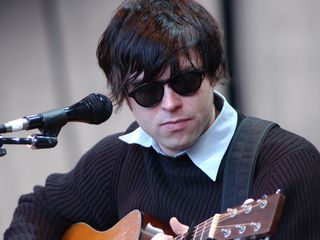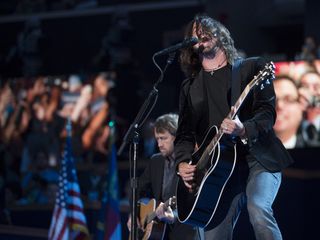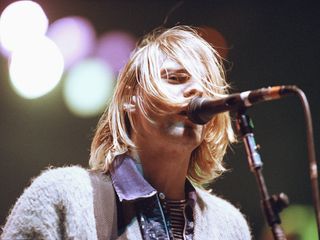When rock goes acoustic
20 genre-defining moments

California Guitar Trio - Bohemian Rhapsody
Like many covers, it takes you back to the original, underlining what a superbly arranged song Bo Rhap always was.
But this version has a charm all of its own – while the original benefited from studio tracking and special effects, the Trio use just three acoustics, a bit of imagination and the sort of nimble-fingered skills that make us all ache with envy.

José Feliciano - Light My Fire
If you’re going to take on a cover version, what fresh angle can you offer to your listeners?
José Feliciano, a gifted musical interpreter over the years, was one of the first Latin guitarists to cross over into the mainstream, and his take on The Doors classic is a prime example of how an acoustic cover can open an already popular song up to a whole new audience.

Ray LaMontagne - Crazy
Some songs find a second home in a place far removed from their original setting, and Crazy is something of a case in point.
Certainly, its air of brooding melancholy and its bittersweet lyric seemed a perfect fit for the whiskery New Hampshire singer-songwriter, and in the years since its release, his cover has spread its wings and gone on to become almost as acclaimed as the original.

Eagles - Hotel California
With Glenn Frey adding chiming 12-string fills (and with the lavish Hell Freezes Over concerts recorded on 48 tracks simultaneously), this seven-minute- plus version of Hotel California is shimmer in excelsis, even managing to outdo the jangle of the original.
As ever, the chorus lands like a right hook, but for guitar
fans, the real magic arrives in the closing minutes, as Walsh and Felder – always a fiercely competitive axe pairing – square up once more in an unplugged rematch of their famous 1977 duel. The Eagles had landed. Again.
Catch part two of our top 20 tomorrow...

Neil Young - My My, Hey Hey (Out Of The Blue)
Back in the 70s, Neil Young had a habit of including both electric and acoustic versions of the same track on his albums.
This song, from 1979’s Rust Never Sleeps, is probably the most famous example. The electric Into the Black version was deliberately couched as a defiant declaration of rock ’n’ roll’s core values, whereas the acoustic companion that opens the album is awash with mournful regret at the passing of an era.
YouTube : youtubeurl

Newton Faulkner - Teardrop
Faulkner's version of Teardrop combines fingerstyle with percussive slaps on the body of his Benjamin JOM.
“One, I love the track,” he explains. “The other thing I saw fairly quickly was that it’s made up of four parts, which are possible to do at the same time. Because you’ve got the [riff] and the bassline and the beat and the vocal. My version is kind of beat-based. I’m just playing the bassline and the top-line.”

Rodrigo Y Gabriela - Stairway To Heaven
Perhaps more than any other standard in the classic-rock repertoire, Stairway carries a huge weight of expectation and is a very easy song to get wrong – but here the Mexican duo got it supremely right.

Chris Cornell - Billie Jean
The Soundgarden frontman's decision to rework Jackson’s most famous song for his 2007 second solo release, Carry On, was a gutsy move.
The album's darkly soulful reworking of Billie Jean broke new ground, but before the release of the album’s electrified version, Cornell debuted his brooding arrangement during an intimate 2006 acoustic session in Sweden using his Martin D-28.
His recent Songbook acoustic tours have continued this stripped-down rendition, and the intimacy has only improved an already dramatic reinterpretation – enhancing the slowed-down, smoky barroom feel of Cornell’s expressive vocal phrasing and arpeggio-to-strum guitar dynamic.

Motörhead - Ace Of Spades
The acoustic reworking of this track – both in the audio format tacked onto the iTunes version of The Wörld Is Yours and in the advert filmed in a café of bemused Frenchmen – is a classic.
While guitarist Phil Campbellpeels off a slide solo on a Gibson acoustic, Lemmy ditches his trademark Rickenbacker bass to wheeze into a harmonica, and proves in the process that the song that kickstarted thrash metal secretly has a progression firmly rooted in the blues.
Best of all is the gallows-humour twist on the original vocal. “I don’t want to live forever,” barks Lemmy, before adding, under his breath, “but apparently I am...”

Counting Crows - Have You Seen Me Lately?
The original is a slice of American indie-rock complete with fuzzy guitars and jangling rhythm parts, which, in comparison, sounds slightly sluggish, almost bland.
Here, though, guitarist David Bryson swaps distortion for a gently picked acoustic guitar part. It’s layered and filled out with a piano, and vocalist Adam Duritz’s live penchant for switching melodies pays off, because what we end up with is a version that sounds more focused and vulnerable – with far greater impact than its rockier counterpart. This is unplugged done right.

Ryan Adams - Wasted Years
Adams' of Iron Maiden’s Wasted Years takes the emotional heart and descending recurring intro melody of the original and frames it with a completely different sound, thanks to Adams’ delicate fingerstyle technique (with a deft thumb pattern keeping momentum).
His respect for the source material is clear – he doesn’t go off-piste with the original vocal melody, and the results shine. It’s simple, honest and respectful, and he makes the song his own. If you want to tackle it yourself, start off by putting your capo on the 3rd fret.

Slash / Myles Kennedy - Sweet Child O' Mine
Great songs will always show a degree of their inherent quality in anyone’s hands, but this takes on a melancholic majesty with these two at the helm.

José González - Heartbeats
“I try to pick songs that aren’t that obvious,” José told The Fader in 2006 regarding his cover choice.
His signature touch of warm fingerpicked melody and lilting vocal has also reworked Kylie's achingly longing Hand On Your Heart, Bronski Beat’s Small Town Boy, Joy Division’s Love Will Tear Us Apart and Massive Attack’s moody Teardrop. Each is inventively reworked.
But there’s no doubt his first recorded cover benefits from the nylon-string González treatment the most. “It’s a matter of listening to songs and finding the harmony that defines them,” José told TinyMixTapes of his approach to doing acoustic covers, “and then hold on to that as much as possible. It takes a little effort.”

John Mayer - Free Fallin'
John Mayer’s version is a sparse-sounding affair. It’s taken from a 2007 concert at the Nokia Theater in Los Angeles, released as the Where The Light Is live album and DVD.
The intimate first part of the gig sees Mayer playing his signature Martin OM-28 acoustic, flanked by ace session guitarist Robbie McIntosh playing slide on a resonator, and David Ryan Harris, who provides further acoustic backing.

Foo Fighters - Everlong
You might expect that removing the original’s four-to-the-floor stomp and wide-ringing powerchords would be the sonic equivalent of snipping the nadgers off a pitbull, but Grohl’s almost-whispered vocals and solo guitar playing lend the song a more vulnerable edge – particularly during the sparse pre-chorus octave parts – that’s every bit as powerful as the full-band arrangement.

Alice In Chains - Down In A Hole
Of all the fan faves the band played that night, their darkest song of all, Down In A Hole, is rendered the most haunting by this treatment.
Without the layers of distortion found on the original version on 1992’s Dirt, the picked verses and starkly confessional lyrics about the descent into addiction bring a new level of intensity, beauty and human fragility to their melancholy.

Stevie Ray Vaughan - Pride And Joy
It’s not exactly a fussy performance, with the stripped-down format betraying the occasional slightly off bend – it is, after all, a 12-string he's putting through its paces (in a style reminiscent of Hendrix's 12-string version of Hear My Train A Comin').
Still, in the golden era of pointless widdling, Vaughan’s blues classic works superbly well as a one-man stand, with the Texan letting the timing breathe and visibly slamming his fingers down onto the neck to emphasise that chunky, rolling rhythm.
TYPE: YouTube | CAPTION: null | SRC: http://www.youtube.com/watch?v=vxVS1jE8VAQ | WIDTH: 460 | HEIGHT: 370. (Click the Edit Attributes/Cog button with cursor placed in this area to edit this tag.)

Eric Clapton - Layla
The acoustic version was born while Clapton rehearsed at home for his MTV Unplugged performance with rhythm guitarist, Andy Fairweather-Low.
He recalls that it “clicked straight away”, though it’s no simple retread. While most guitarists would have merely played the same arrangement, sans electricity, Clapton rebuilt his song from the ground up, singing it an octave down, soaking the iconic lick in Valium and ditching the outro “For a start, making it acoustic denied all the riffs, which I think would have really sounded a bit weak on the acoustic,” he noted. “So, it just seemed to naturally become jazzier.”

Nirvana - All Apologies
Cobain’s outsider lyrics were often vague and open to interpretation (and much debate), but All Apologies features some of Kurt’s more lucid moments, and seems every bit as guilt-laden on Unplugged as the original.
Originally the final song on In Utero, the song features what is perhaps Kurt’s most intricate guitar line during the Unplugged performance. The main riff is played by Kurt in the intro, then Pat Smear takes over for the verses, allowing Kurt to play a simplified rhythm part while he sings.
During the outro, however, Kurt doubles with Pat Smear while singing the line “All in all is all we are” as Lori Goldston’s cello, the two guitars, bass and drums drop out gradually until all we’re left with is Cobain and Grohl’s harmonised vocals.
Listened to in context with Cobain’s untimely death, it’s a hair-raising performance that becomes more powerful with every viewing. So powerful, it almost tops our countdown.

Johnny Cash - Hurt
Am, C, D... those simple picked chords ringing out on an acoustic aren’t flashy. But they carry so much weight.
Cash didn’t automatically connect with Hurt – despite the themes of addiction and hitting rock bottom, an affliction Cash had suffered and a place he had been in his younger years. “We were looking for a song that we felt had an impact,” Cash explained to Time’s Lev Grossman in his last ever interview.
“[Rick Rubin] asked me what I thought of it. I said, ‘I think it’s probably the best anti-drug song I ever heard, but I don’t think it’s for me.’ And he said, ‘Why?’ I said, ‘Because it’s not my style, it’s not the way I do it.’ And he said, ‘What if it were?’ And I said, ‘Well, I could give it a try.’ So, I went out and recorded it. When I listened to it, I felt it came out all right.”
It’s quite an understatement from The Man In Black, but the magic you hear on the recording didn’t just come out of thin air: Cash worked hard for it. And he had to inhabit Hurt before he could track it. “I would just get down and do it until I felt like I was doing it with feeling,” Cash told Time. “I probably sang the song 100 times before I went in and recorded it, because I had to make it mine.”

Total Guitar is Europe's best-selling guitar magazine.
Every month we feature interviews with the biggest names and hottest new acts in guitar land, plus Guest Lessons from the stars.
Finally, our Rocked & Rated section is the place to go for reviews, round-ups and help setting up your guitars and gear.
Subscribe: http://bit.ly/totalguitar

“Look out!! Coming in hot! What an honour of a lifetime!!”: Martin is digging out the Brazilian rosewood for Joe Bonamassa as the blues superstar teases new holy grail signature acoustic

“Packed with musical features to keep you jamming without missing a beat!”: Electro-Harmonix’s Pico 360+ is tiny $137 looper with 360 seconds of recording time and unlimited overdubs

“Look out!! Coming in hot! What an honour of a lifetime!!”: Martin is digging out the Brazilian rosewood for Joe Bonamassa as the blues superstar teases new holy grail signature acoustic

“Packed with musical features to keep you jamming without missing a beat!”: Electro-Harmonix’s Pico 360+ is tiny $137 looper with 360 seconds of recording time and unlimited overdubs
Most Popular










